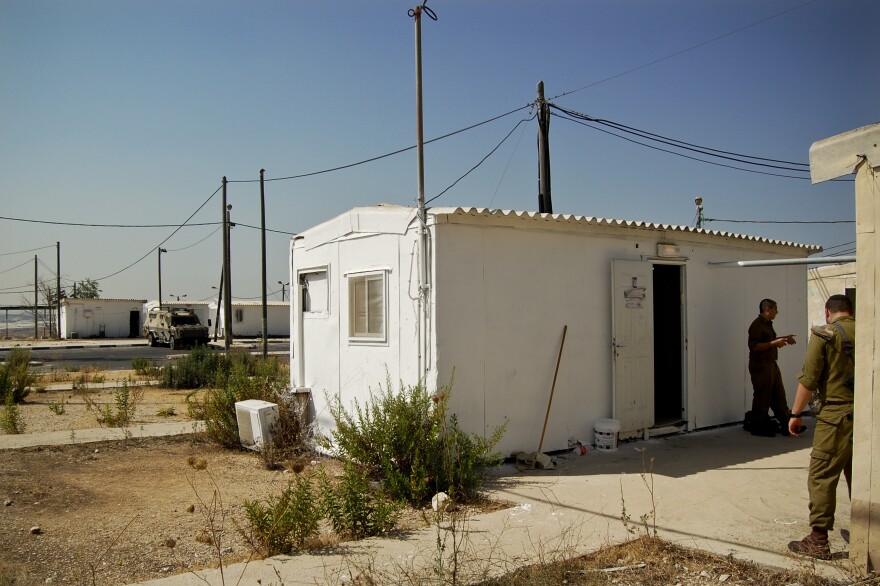Moshe Haim always wanted to be a soldier. The 20-year-old is now a sergeant, more than halfway through three years of service in the Israeli military.
But when he goes home on leave, he doesn't talk about his military experiences to any of his eight siblings, especially his brothers.
"I know that for my parents and my brothers, the first, best choice is to be in the yeshiva and study there," he says at a small West Bank outpost where he's stationed. "It wasn't good for me, but my brothers are still pure."
Haim grew up in an ultra-Orthodox Jewish family in Israel. Tradition and deeply held values in that community dictate that boys study the Torah and other religious texts at school and into adulthood.
If they do, they are excused from military service in Israel. This exemption to the otherwise universal draft for Israeli Jews has been in existence for as long as Israel has been a country — part of an early bargain struck between religious and Zionist leaders.
Haim thought it would be impossible to serve in the military and remain part of his community. But in his teens, he learned of a special battalion that is entirely made up of ultra-Orthodox men.
"I heard about it from people in my neighborhood who went and remained religious," says Haim. "It was a good solution for me because it combines Torah with fighting."
Like Haim, Lt. Yoel Bagad left yeshiva for the military.
"It was too hard for me to study from 7 in the morning to 11 at night," he says.
The number of ultra-Orthodox men leaving full-time religious study and serving in the Israeli military has grown significantly in the past five years. In 2007, slightly fewer than 300 ultra-Orthodox served. Last year, 1,500 did.
Now the Israeli government is moving to end the exemption for religious scholars. This week, the Cabinet approved a draft law that, if it passes parliament, would phase in mandatory ultra-Orthodox service over four years. About 1,800 Torah students would still be excused, compared to about 8,000 a year now.
A Matter Of Israel's Future
This would be an enormous change in Israel, and it has fanned the flames of an already highly charged debate about the role of conservative religious communities in the country. Tens of thousands of ultra-Orthodox have protested the military proposals — demonstrating in Europe and New York as well as in Israel. Some ultra-Orthodox soldiers have been attacked when they return to their neighborhoods.

Yitzchak Pindrus, an ultra-Orthodox Jew and a deputy mayor of Jerusalem, says this is a political debate much bigger than the military draft. He says it's about the future of Israel.
"We believe deeply that the future of the Jewish nation depends on the people that study the Torah," he says. "[Supporters of this law] are trying to make our community not legitimate. They are frightened of the growth of the ultra-Orthodox community."
That growth rate is significant — nearly twice as high as the general population. At the same time, employment levels among ultra-Orthodox men are significantly lower. This means lower tax receipts and higher social support costs for the government.
The military sees service as a way to get more ultra-Orthodox men into the workforce.
"When they are in the Israeli Defense Forces we give them training and education, which helps them find jobs," says Lt. Col. Amir Badmani, in the planning department of the Israeli military. "About 90 percent of the ultra-Orthodox who serve in the IDF join the workforce afterward."
Other Minorities' Experiences
The IDF is laying the groundwork to incorporate thousands of new draftees. A new pre-military academy for ultra-Orthodox is due to open in a few months.

The military is also drawing on its experience with other Israeli minorities, like the Druze, an Arabic-speaking religious group, which also has its own battalion. The Druze are not required to serve in the military, but one Druze commander, Lt Col. Sha'adi Abu Faris, says it's a good option for many.
"When the commanders themselves are Druze, they understand the soldiers' faith. They are able to be much more accommodating," Faris says. "Also, there is a major effort to help soldiers with whatever they need, for example, improving Hebrew, even at the expense of training time."
Ending the draft exemption for yeshiva scholars was a promise of Yesh Atid, the new political party that rose to prominence in January elections. Supporters, including Prime Minister Benjamin Netanyahu, call this a way to equalize the "burden" of contributing to society.
"Our objective is two-fold," he said before the Cabinet vote approving mandatory military service. "Integrating young ultra-Orthodox into IDF and national service and, no less important, integrating them into the labor force."
But Haim Zicherman, who grew up in an ultra-Orthodox family but no longer practices Judaism in that tradition, says integration is coming naturally, as the number of "modern" members of the community grows.
He says there are many legal problems with the draft law, including inequity — most ultra-Orthodox women will still be excused from military service — and potential corruption in whatever system is finally set up to choose the 1,800 young men who will still be allowed to study religious texts full time.
But Zicherman's biggest fear is that attempts to enforce the law will lead to more divisions and confrontations among Israelis.
"What are you going to do if at the end of the process the yeshiva students say, 'I don't want to go to the army,' " he asks. "Are you going to come with tanks and take everybody to jail?"
Copyright 2021 NPR. To see more, visit https://www.npr.org. 9(MDEwMTk5OTQ0MDEzNDkxMDYyMDQ2MjdiMw004))




